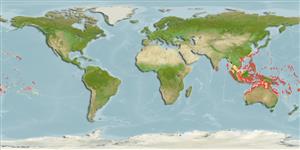Common names from other countries
>
Acanthuriformes (Surgeonfishes) >
Siganidae (Rabbitfishes)
Etymology: Siganus: Latin, siganus = a fish, rabbit fish; by the similarity of the nose (Ref. 45335).
More on author: Linnaeus.
Environment: milieu / climate zone / depth range / distribution range
экология
морской ассоциированный с рифами; пределы глубины 1 - 50 m (Ref. 28016), usually 1 - 20 m (Ref. 27115). Tropical; 24°C - 28°C (Ref. 27115); 30°N - 30°S, 77°E - 129°W
Indo-West Pacific: Known from India to French Polynesia; north to Japan; south to New Caledonia.
Size / Вес / Возраст
Maturity: Lm ? range ? - ? cm
Max length : 28.0 cm TL самец/пол неопределен; (Ref. 9710); common length : 18.0 cm TL самец/пол неопределен; (Ref. 9813)
колючие лучи спинного плавника (общее число) : 13; членистые (мягкие) лучи спинного плавника (общее число) : 10; колючие лучи анального плавника: 7; членистые (мягкие) лучи анального плавника: 9; позвонки: 13. The species can adopt a number of camouflage patterns involving off-white, pale gray to blackish, and various shades of brown. The basic pattern consists of a labyrinth of narrow bands with upper half vermiculate, the lower ones tend to meander horizontally. This pattern extends to the fins. Iris golden dissected by a chocolate cross. 4-5 irregular off-white bars on caudal peduncle. Scales fine on cheeks, densely packed over lower 2/3 of preopercular region. Midline of thorax without scales between pelvic ridges. Fin spines stout, pungent, venomous. Preopercular angle 87-100 degrees.
Adults inhabit shallow coral reef flats. Found in rivers (Ref. 12792, 48637). Occurs in small schools (usually less than 10 individuals). Juveniles gather in larger numbers in corals with algae-grown at their bases (Ref. 48637). Initially, they browse on fine textured, e.g. filamentous algae, switching to coarser algae with increasing size. Both adults and juveniles are diurnal feeders (Ref. 4666). Fry are marketed fresh, pickled in brine or made into fish paste (Ref. 9813). Can inflict painful stings (Ref. 4690).
Life cycle and mating behavior
Maturities | размножение | Spawnings | Egg(s) | Fecundities | личинки
Woodland, D.J., 1990. Revision of the fish family Siganidae with descriptions of two new species and comments on distribution and biology. Indo-Pac. Fish. (19):136 p. (Ref. 1419)
Статус Красного Списка МСОП (Ref. 130435)
CITES (Ref. 128078)
Not Evaluated
Использование человеком
рыболовство: не имеет хозяйственного значения; аквариум: коммерческий
дополнительная информация
инструменты
Специальные отчеты
Скачать в формате XML
ресурсы в Интернет
Estimates based on models
Preferred temperature (Ref.
115969): 24.6 - 29, mean 28 (based on 950 cells).
Phylogenetic diversity index (Ref.
82804): PD
50 = 0.5000 [Uniqueness, from 0.5 = low to 2.0 = high].
Bayesian length-weight: a=0.01950 (0.01284 - 0.02961), b=3.01 (2.89 - 3.13), in cm Total Length, based on LWR estimates for this species & Genus-body shape (Ref.
93245).
Trophic level (Ref.
69278): 2.0 ±0.03 se; based on food items.
устойчивость к внешним воздействиям (Ref.
120179): высокий, минимальное время удвоения популяции до 15 месяцев (Preliminary K or Fecundity.).
Prior r = 1.20, 95% CL = 0.79 - 1.80, Based on 1 data-limited stock assessment.
Fishing Vulnerability (Ref.
59153): Low vulnerability (14 of 100).
